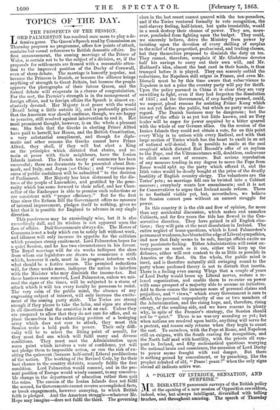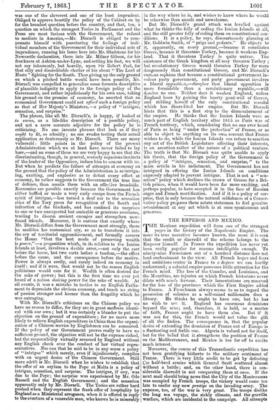A " POLICY OF INTRIGUE, SENSATION, AND SURPRISE." ATR. DISRAELI'S
panoramic surveys of the British policy .1.11 at the opening of a new session of Opposition are seldom, indeed, wise, but always intelligent, diversified with telling touches, and throughout amusing. The speech of Thursday was one of the cleverest and one of the least imprudent. Obliged to approve heartily the policy of the Cabinet on by far the broadest question before the country, and that, too, a question on which the strongest Tories in Parliament and the Press are most furious with the Government, the refusal to mediate in America,—Mr. Disraeli is obliged to com- pensate himself with puncturing the feelings of indi- vidual members of the Government for their individual acts of imprudence, running his lance here into Mr. Gladstone for his Newcastle declaration, there into Mr. Milner Gibson, for his frankness at Ashton-under-Lyne, and setting his foot, we will not say inhumanly, but heavily, upon Sir Robert Peel, for that silly and discreditable chatter of his about " The Lord of Hosts " fighting for the South. Thus giving up the only ground on which a pitched battle would have been possible, Mr. Disraeli was compelled to generalize some formula descriptive of plausible indignity to apply to the foreign policy of the Government, and rather injudiciously for his own case, taking his ground on the promise of economy, he asserted that an economical Government could not aprd such a foreign policy as that of Her Majesty's Ministers,—a policy of " intrigue, sensation, and surprise." The phrase, like all Mr. Disraeli's, is happy, if looked at In vacuo, as a life-like description of a possible policy, and not a mere accurate adjective for the policy he is criticizing. No one invents phrases that look as if they ought to fit, so adroitly ; no one evades testing their actual application so dexterously as Mr. Disraeli. There are many vulnerabl , little points in the policy of the present Administration which we at least have never failed to lay bare,—and on some of these we are very happy to see that the discriminating, though, in general, scarcely sagacious instincts of the leader of the Opposition, induce him to concur with us. But when he predicts the failure of attempts at economy on the ground that the policy of the Administration is so intrigu- ing, exciting, and explosive as to defeat every effort at economy, he rather suggests to the Government the true line of defence, than assails them with an effecUve broadside. Economies are possible exactly because the Government has either baffled or made a very early escape from the French spirit of intrigue,—has turned a deaf ear to the sensation cries of the Tory press for recognition of the South and infraction of the blockade, and has confined its surprises to one or two unexpected but amicable or generous overtures, tending to disarm ancient energies and strengthen new- found friends. Moreover, it is curious that exactly where Mr. Disraeli differs from the Government most strongly, there he modifies his economical cry, so as to transform it into the cry of territorial aggrandizement, and formally assures the House "that the best mode of preserving wealth is power,"—a proposition which, in its relation to the Ionian Islands at least, involves a double error,—not only the cart before the horse, but two carts before a tandem,—the effect before the cause, and the consequence before the motive. Power is always costly, and rarely indeed an economy in itself : and if it were, that would not be the reason English politicians would care for it. Wealth is often desired for the sake of power; but this is the first time we ever yet heard of a nation desiring power for the sake of wealth. At all events, it was a mistake in tactics to an English Parlia- ment to depreciate the obvious economy, and touch no string of passion stronger and keener than the frugality which he was outraging.
With Mr. Disraeli's criticisms on the Chinese policy we have no reason to differ, for they are in great measure identi- cal with our own ; but it was certainly a blunder to put the objection on the ground of expenditure ; for no move more likely to relieve English expenditure in China than the organi- zation of a Chinese service by Englishmen can be conceived. If the policy of our Government proves really to have no sufficient ground, the objection will not be the expense risked, but the responsibility virtually assumed by England without any English check over the conduct of her virtual repre- sentatives. Nor caa that be said to be in any sense a policy of "intrigue" which merely, even if injudiciously, complies with an urgent desire of the Chinese Government. Still more adrift is Mr. Disraeli when he wishes to establish that the offer of an asylum to the Pope at Malta is a policy of intrigue, sensation, and surpriae. The intrigue, if any, was due to the Pope; the surprise was experienced by Mr. Ode Russell and the English Government ; and the sensation apparently only by Mr. Disraeli. The Tories are rather hard pushed when they represent the frank offer of hospitality by England as a Ministerial arrogance, when it is offered in reply to the overture of a venerable man, who knows he is miserably in the way where he is, and wishes to know where he would be otherwise than unsafe and unwelcome.
But Mr. Disraeli's grand attack was levelled against what he thinks the folly of ceding the Ionian Islands at all, and the still greater folly of ceding them on constitutional con- ditions. It is a policy, he says, discourteously glancing at Mr. Goldwin Smith, of " prigs and pedants." lie objects to it, apparently, on every ground,—because it conciliates Greece, because it threatens Turkey, because it weakens Eng- land. That it threatens Turkey is quite untrue. The existence of the Greek kingdom at all may threaten Turkey ; but revolutionary Greece would threaten Turkey far more dangerously than constitutional Greece, and Mr. Disraeli's curis,us sophism that because a constitutional government in- volves party government, and party government involves a liberal opposition,—therefore that liberal opposition is more formidable than a revolutionary republic,—will dkceive no one. Neither does it weaken England, unless England loses by gaining the hearty good-will of Greece, and ridding herself of the only constitutional scandal which has discredited her empire. But Mr. Disraeli hints that this is a first step to the dismemberment of the empire. He thinks that the Ionian Islands were as much part of English territory after 1815 as Paris was of French territory, which, considering that no one ever heard of Paris as being " under the protection" of France, or as able to object to anything on its own account that France wishes to do, while the Ionian Islands can refuse to sanction any act of the British Legislature affecting their interests, is an assertion rather of the nature of a political venture. The truth is that Mr. Disraeli was quite unable to apply his thesis, that the foreign policy of the Government is a policy of "intrigue, sensation, and surprise," to the main article in his indictment. The Government has not intrigued in offering the Ionian Islands on conditions expressly adapted to prevent intrigue. That is not a " sen- sation" policy which declines the crown of Greece for a Bri- tish prince, when it would have been far more exciting, and perhaps popular, to have accepted it in the face of Russian anger and French mortification. And if it is a policy of sur- prise, that is only because the natural selfishness of a Conser- vative policy prepares these astute statesmen to feel genuine astonishment at any act which is at once spontaneous and generous.































 Previous page
Previous page